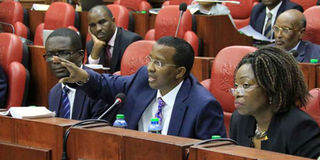We have another opportunity to set up a credible electoral team

From left: Independent Electoral and Boundaries Commission Chief Executive Officer Ezra Chiloba, Chairman Issack Hassan and Vice-Chairperson Lilian Mahiri-Zaja before a joint parliamentary committee on the body at Parliament Buildings, on August 2, 2016. PHOTO | JEFF ANGOTE | NATION MEDIA GROUP
What you need to know:
- It is noteworthy that what led to the 2007-2008 post-election violence was the overwhelming feeling that the now defunct Electoral Commission of Kenya was compromised.
To avoid what happened in Kenya after the 2007 General Election, Parliament, politicians, civil society, and all other Kenyans must rise to the occasion and install a competent and impartial Independent Electoral and Boundaries Commission.
Six years after the promulgation of the Constitution, Kenya has yet to get an electoral body that passes the integrity test. The reforms that were hoped for under the new Constitution have been delayed and sabotaged due to vested political interests.
Therefore, the current vacuum should be seen as a second chance at realising a truly transparent and trusted electoral body. There is a deal in sight, but the joint committee is yet to agree on the mode of picking the electoral commission bosses.
On the one hand, Cord is proposing direct nomination of the commissioners by the majority and minority parties, while Jubilee wants the involvement of a selection panel recruited by the Public Service Commission.
However, the Independent Electoral and Boundaries Commission (IEBC) being a creature of Article 88 of the Constitution, it follows that constitutional principles must reign supreme, above all political machinations, including political parties.
For this reason, despite the genuine concerns about the limited time available to prepare for the next General Election, the process of filling the IEBC positions should as much as possible be owned by Kenyans.
As the Joint Select Committee on Electoral Reforms tries to chart the way forward in the wake of this vacuum, political competition and egos should not be allowed to take over the process.
By all means, Kenyans, through the leadership of Senators James Orengo and Kiraitu Murungi, should effectively utilise this opportunity to cleanse the IEBC as a show of commitment to the vision and ideals set for the country by the Constitution as far as birthing a credible electoral body is concerned.
As major stakeholders in the outcome and process, Kenyans should, as a matter of necessity, participate in the process.
WATERSHED MOMENT
The promulgation of the Constitution in August, 2010 was a watershed moment in Kenyan electoral governance history as it outlined a more transparent electoral body.
Thus, in seizing this moment, five considerations should be brought to the fore.
First, high integrity and impartiality that espouses honesty, respect for the people, public confidence, and integrity of the office. The commissioners must be beyond reproach and free from discernable political affiliation. They must only be beholden to the people of Kenya. Political near-sightedness should be avoided at all costs. Leaders, within and without government, who plan only through the lenses of one or two political cycles will not genuinely set up institutions designed to stand the test of time. They will seek to appoint commissioners whom they can control or influence.
Second, an integral identifier of the replacements for the departed commissioners should be a deep understanding of and fidelity to the Constitution.
For Kenyans to have true confidence in the new commissioners, there must be transparency and accurate and impartial reporting of the process by the media. A society that is informed makes the best decisions based on facts, in line with Articles 33 and 34 of the Constitution.
Civil society, professional bodies, faith-based bodies, smaller political parties, minorities, women, and persons with disabilities must be involved in the process. Even though Jubilee and Cord command the biggest political support in the country, it still remains that they do not represent the entire Kenyan body politic.
It is noteworthy that what led to the 2007-2008 post-election violence was the overwhelming feeling that the now defunct Electoral Commission of Kenya was compromised. To avoid what happened in Kenya after the 2007 General Election, Parliament, politicians, civil society, and all other Kenyans must rise to the occasion and install a competent and impartial IEBC.
In the words of George Santayana that were made famous by Sir Winston Churchill, “those who fail to learn from history are doomed to repeat it”.
In light of the prevailing technical opacity on how to select the commissioners, a binding factor for the differing sides has to be the execution of whatever solution arrived at in the spirit of the Constitution and for the good of the people.
Demas Kiprono ([email protected]) and Churchill Ongere ([email protected]) work for Article 19 Eastern Africa.





